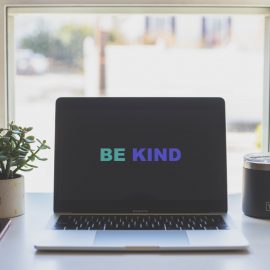

This article is an excerpt from the Shortform book guide to "Girl, Stop Apologizing" by Rachel Hollis. Shortform has the world's best summaries and analyses of books you should be reading.
Like this article? Sign up for a free trial here .
What are the top three habits of successful women? How can adopting these habits help you become more successful in life?
Author, motivational speaker, and businesswoman Rachel Hollis outlined the three habits you should adopt if you want to become successful in life. Those habits are: 1) lay a healthy foundation, 2) trust your inner voice, and 3) advocate for yourself.
Learn more about each habit below.
The Best Habits to Adopt
Rachel Hollis stresses that our behavior and habits are choices, whether or not we are conscious of them. Because of this, we are capable of changing our behaviors so that they better serve us. We will examine each of the habits of successful women that Hollis identifies as being crucial to success and discuss strategies for implementing the behavior in your own life.
1. Start With a Solid Foundation
Before any other behaviors can be modified, Hollis strongly suggests you start by laying a healthy foundation. These are the habits and routines that will allow your new mindset and behaviors to flourish. She gives the following advice:
- Wake up early: Spend at least an hour each morning focusing on your goals before you start living for anyone else.
- Hydrate: Drink half your body weight in ounces of water each day.
- Eat healthy: Replace at least one unhealthy food in your diet (to start).
- Move your body: Spend at least 30 minutes moving each day.
- Practice gratitude: Designate time every day to reflect on what you are grateful for.
(Shortform note: What makes these areas important? All of them contribute to your energy levels. Taking a look at Lifehack’s list of 74 Healthy Habits That Will Drastically Improve Every Area of Your Life, you will notice that essentially every item listed (chew your food, walk at lunchtime, and so on) could be classified into one of the categories Hollis examines. The running theme in both Lifehack’s list and Hollis’s is that your overall energy and zest for life will increase if you incorporate the habits they discuss.)
2. Trust Yourself as the Voice of Authority
Hollis notes that throughout history, and across the globe, the vast majority of cultures have been patriarchal. This means that the voice of authority in nearly every government and community has been male since the beginning of time. On a smaller scale, in many (not all) families, the father is the decision maker. So for most of us, the voice of authority growing up was male, and this is now ingrained in our subconscious beliefs about leadership.
If you’re a woman, Hollis says you must rewire this subconscious belief system in order to trust your own authority without the need for male validation. This takes conscious effort.
| The Relationship Between Approval-Seeking and Codependence Codependency is a psychological condition—often experienced by children of alcoholics and addicts—in which one person has an unhealthy need for another person’s approval. Hollis is an admitted codependent. When she was growing up, every decision she made hinged on her father’s potential reaction. She sought his approval and feared his disappointment. After a decade of marriage, Hollis realized she had transferred the position of authority from her father to her husband, and she was now living for his approval and seeking his validation with every decision she made. When Hollis eventually began trusting her own decision-making skills, it was a major catalyst for her success. Codependent No More by Melody Beattie explains this pattern of behavior in depth. Her message (and Hollis’s) is that you can only break free of codependence by recognizing that other people’s thoughts and behavior aren’t your responsibility nor are they within your control. |
3. Advocate for Yourself
After building healthy habits and trusting your own authority, Hollis wants you to advocate for yourself. Speak up—unapologetically—because while your “village” wants to help, they can’t read your mind.
Hollis says the two best ways to advocate for yourself (and move more quickly toward your goal) is to ask for help when you need it and say no to requests that will hinder your progress.
Ask for Help
Hollis acknowledges that asking for help isn’t easy. Women in particular tend to feel guilty for inconveniencing anybody else, or they feel weak if they cannot “do it all.” This guilt and shame must be overcome.
Hollis reminds us that we each have an entire village that we can turn to when we need help. This help can come in different forms:
- Emotional support from your loved ones when you feel like quitting
- Financial support to help you get that college degree
- Child care, help around the house, and so on
| The Connection Between Help and Judgment Brené Brown (shame expert and author of Daring Greatly) discusses in a 2013 interview with Oprah the connection between help and self-judgment. According to Brown, if you judge yourself when you ask for help, then you’re also judging others when you offer help. This can cause a bit of cognitive dissonance, as you’re likely thinking: I don’t judge others when they ask for help! However, consider this alternative viewpoint: Try instead to view the need for help as a transaction. Acknowledge that you will help when somebody else needs it, and you will receive help when you need it. Taking this perspective will release any shame that you might otherwise feel when asking for help. |
Say No
Beyond asking for help when you need it, Hollis’s second way of advocating for yourself is saying “no.” As she explains, declining requests without guilt allows you to reserve your energies for the areas of your life that are most important to you.
Hollis recommends you start by making a simple list of your priorities. Then, if the request isn’t going to serve your priorities, Hollis says you should politely decline. When you’ve decided to say no, Hollis recommends you do it as soon as possible, be polite but honest, and give a clear and firm “no” (not a probably or maybe).
| Reframing Your Thinking: A No Is a Yes In Essentialism: The Disciplined Pursuit of Less, Greg McKeown argues that for every “no” you deliver, you’re really saying “yes” to something else. For example, if your friends invite you to dinner and it would mean missing family game night, instead of thinking, “I’m saying no to my friends,” reframe your thinking into, “I’m saying yes to my family.” In this same chapter, he also offers some creative ways to decline an invitation for those who feel the word “no” is too harsh or daunting. For instance, offer an alternative. If you are uncomfortable completing the request, try offering what you are willing to do. For example, if a friend asks to borrow your car to drive to the airport, try saying, “I can’t do that, but I will take you to the airport if you’d like.” It shows that you want to help, but you still keep your boundary. |

———End of Preview———
Like what you just read? Read the rest of the world's best book summary and analysis of Rachel Hollis's "Girl, Stop Apologizing" at Shortform .
Here's what you'll find in our full Girl, Stop Apologizing summary :
- Rachel Hollis's lessons she learned while building a multimillion-dollar company
- Why "having it all" isn't something you should aspire to
- Why women need to stop trying to fit society's idea of a "good woman"






